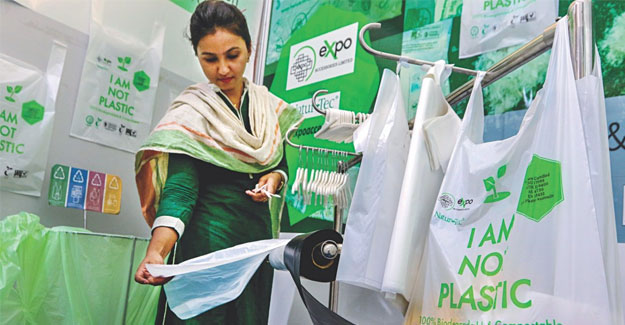
Bangladeshi Company Makes Biodegradable Packing For Apparel Exporters
A Bangladeshi company is producing biodegradable packaging from an unlikely source material - corn or maize - with the aim of offering a suitable alternative to polythene bags, which survive in soil for several hundred years and leave devastating impacts on the environment. Expo Accessories Ltd has initially targeted Bangladesh's garment industry and supplies the bags to 30 factories, said Md Enamul Haque, its managing director. "As our items are biodegradable and compostable, we are getting a huge response from the market," he said. "The demand for biodegradable products is increasing globally, and Bangladesh is no exception." At present, Expo Accessories produces around 300,000 bags every day, but it has the potential to manufacture 800,000 pieces, he said. The factory is located at Kamarpara in Gazipur. The thickness of the bags made from corn is 20 micron, which is less than most of the polythene bags available in the market. "We are now making bags only for garment factories in Bangladesh,and the minimum price of a bag is 5-6 cent [approximately Tk 4-5]. But we are planning mass-scale production, eyeing the local market," he said. Expo Accessories began manufacturing in 2014, and collects the raw material -- the corn fibre -- from India. The bags now come in three colours: white, black and green. Enamul said, "Our clients are foreign buyers. A total of 30 garment factories in Bangladesh which manufacture for foreign brands are collecting bags from us." The company also makes shirt clips, collar stays, hang tags, hangers from the corn fibre. Enamul said the bag is certified by the International Organization for Standardization (ISO 17088), which specifies the requirements for the labelling of plastic products as "compostable" or "biodegradable". The product is also compliant with Restricted Substance List or RSL, which means it does not contain any heavy metal. The key features of the bags include reduced carbon footprint in comparison to conventional plastics and 100% biodegradability and compostability. Its shelf life is around 12-15 months, meaning they would biodegrade within this period. Enamul said they are planning to export and produce single-use plastics like cup, box, spoon, shopping bag, garbage bag, and bin bag to chain shops. One of Expo Accessories' clients is Youngone Corporation, which operates several production facilities, including of garment products, in Bangladesh. Youngone's merchandiser Pearo Zabed said, "We started taking the bags from them in 2014. Our main buyer is world-famous brand Levis. Levis nominated this company as the bags are environment-friendly. The price is high, but buyers always consider the environmental aspects." Iftekharul Alam Suman, assistant manager (merchandiser) of Opex and Sinha Textile Group, which is another buyer of the bags, said, "We are using biodegradable poly bags as it is the buyers' requirement. The cost of the bag varies from five to eight cents. But buyers put emphasis on biodegradable bags because they are environment-friendly." Every day, about 2 crore polybags are used in Dhaka city alone, according to environmental organisation Poribesh Bachao Andolon (Poba). Despite various efforts by the government to encourage the use of biodegradable packaging such as jute bags, polythene bags are still ubiquitous. Polythene bags were banned in Bangladesh in 2002. Quazi Sarwar Imtiaz Hashmi, former additional director general of the Department of Environment, said they have tested the bag in lab, and found that it does not have any polythene materials and is biodegradable and compostable.
Textile Excellence
If you wish to Subscribe to Textile Excellence Print Edition, kindly fill in the below form and we shall get back to you with details.













